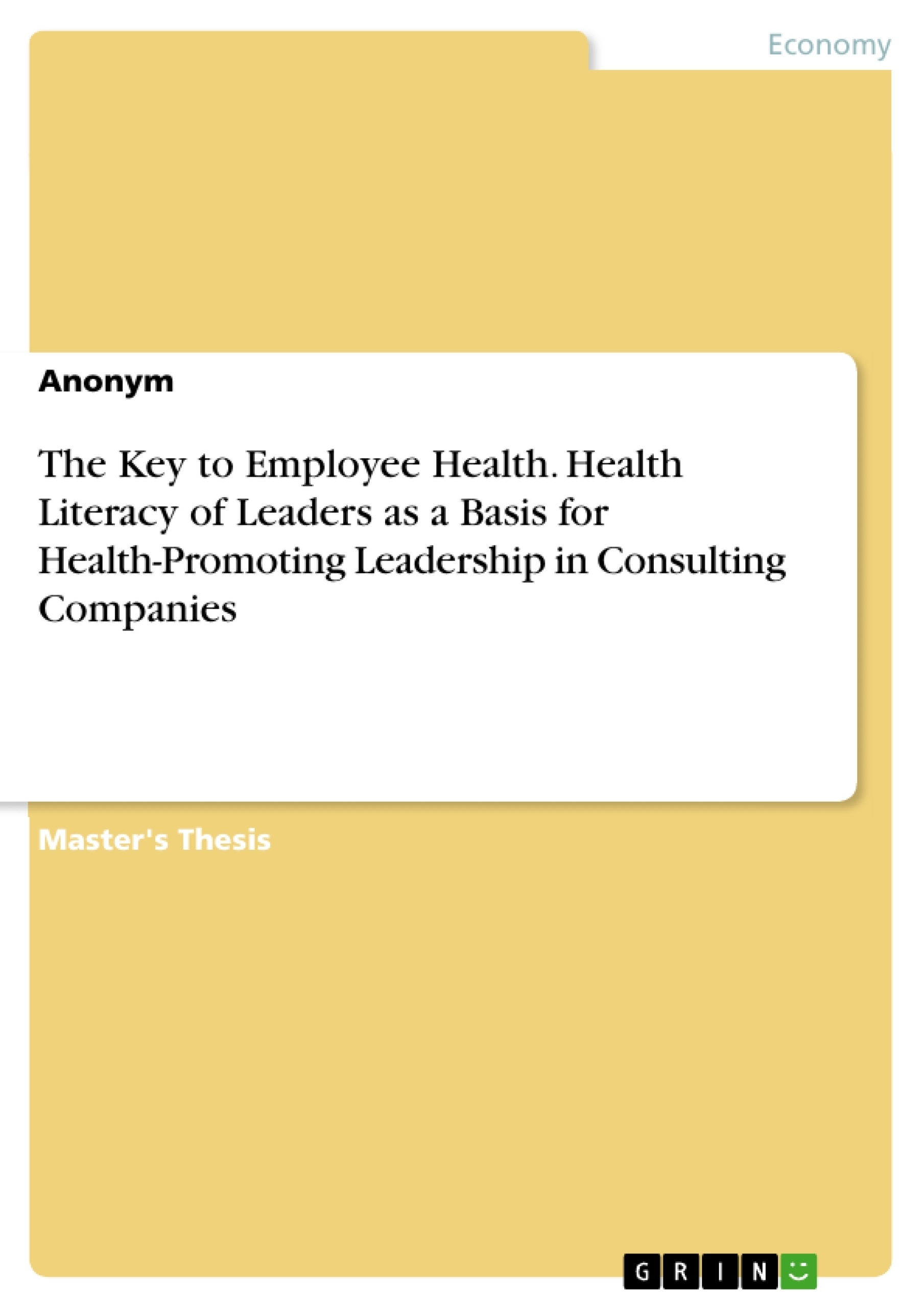Over the last 20 years, the prevalence of mental illness has risen significantly worldwide, with cumulative annual costs to companies of around one trillion US dollars in lost productivity (WHO, 2021). In the context of the megatrend of health, HPL is a key element to strengthen well-being, resistance, and performance of employees.
The correlation between HPL and HL is an under-researched field and has not been investigated in consultancies. The objective is to investigate the self-assessed HL of leaders and employees of consulting companies and to examine to which extent HL depends on individual characteristics. A quantitative assessment of HL was conducted through an online questionnaire based on the European Health Literacy Questionnaire (HLS-EU-Q47), and the responses were statistically analysed.
Inhaltsverzeichnis (Table of Contents)
- Introduction
- Relevance of health-promoting leadership
- Research objective
- Research gap
- Review of current thinking
- Definition of relevant health terms
- Definition of health
- Definition of health literacy
- Definition of health-promoting leadership
- Leadership challenges
- Coping with increasing stress
- Developing healthy self-leadership
- Caring about health despite distant leadership
- Correlation between health literacy and health-promoting leadership
- Development of hypotheses
- Modelling the research framework
- Research methodology
- Justification of the research direction
- Description of the survey instrument
- Choices based on the research onion model
- Research design
- Details of the questionnaire
- Measurements and calculations
- Sampling method
- Method of evaluation
- Quality criteria of empirical research
- Results and recommendations
- Presentation of the people data
- Presentation of the dataset
- Descriptive statistics
- Inferential statistics
- Statistical analysis
- Effects between age, gender, and leadership responsibility
- Testing of the hypotheses
- Conclusion of the hypotheses testing
- Recommendation for action
- Discussion
- Major contributions of this dissertation
- Key findings
- Robustness of the results
- Innovativeness of the results
- Contribution to the practice
- Limitations
- Possibilities for future research directions
Zielsetzung und Themenschwerpunkte (Objectives and Key Themes)
This dissertation aims to investigate the connection between health-promoting leadership (HPL) and health literacy (HL) in consulting companies. It explores the level of HL among leaders and employees in this industry and examines the extent to which HL is influenced by individual characteristics. The research utilizes a quantitative approach, analyzing data collected through an online questionnaire based on the European Health Literacy Questionnaire (HLS-EU-Q47).
- The role of health-promoting leadership in promoting employee well-being and performance
- The relationship between health literacy and health-promoting leadership
- The impact of individual characteristics on health literacy in the context of consulting companies
- The identification of gaps in health literacy within the consulting industry
- The development of actionable recommendations to enhance health literacy in consulting companies
Zusammenfassung der Kapitel (Chapter Summaries)
- Introduction: This chapter establishes the relevance of HPL in the context of increasing mental health issues and their impact on productivity in organizations. It outlines the research objective, which is to explore the relationship between HPL and HL in consulting companies, and identifies the existing gap in research on this topic.
- Review of current thinking: This chapter provides definitions of relevant health terms, including health, health literacy, and health-promoting leadership. It then explores the challenges faced by leaders in promoting health within organizations, such as coping with stress, developing healthy self-leadership, and addressing the challenges of distance leadership. The chapter concludes by discussing the correlation between HL and HPL and outlines the hypotheses developed for the study.
- Research methodology: This chapter justifies the chosen research direction and details the survey instrument used to collect data. It explains the research design, the structure and content of the questionnaire, the sampling method, and the evaluation method used. The chapter also addresses the quality criteria of empirical research.
- Results and recommendations: This chapter presents the collected data and its analysis. It provides descriptive statistics, inferential statistics, and explores the relationships between age, gender, leadership responsibility, and HL. The chapter concludes with a detailed analysis of the hypotheses and offers recommendations for action based on the research findings.
- Discussion: This chapter discusses the key findings of the research, highlighting their robustness, innovativeness, and contribution to practice. It also acknowledges the limitations of the study and explores potential directions for future research.
Schlüsselwörter (Keywords)
This dissertation focuses on the key concepts of health literacy, health-promoting leadership, employee well-being, consulting companies, and quantitative research methodology. It examines the relationship between these concepts, investigating the level of health literacy among leaders and employees in the consulting industry and exploring the factors influencing health literacy in this context.
Frequently Asked Questions
What is Health Literacy (HL) in the workplace?
Health literacy refers to the ability of individuals to access, understand, appraise, and apply health information to make informed decisions about their well-being.
Why is health-promoting leadership (HPL) important for consultancies?
HPL is crucial to strengthen employee well-being and performance, especially given the high-stress environment and rising mental health costs in the consulting industry.
What was the main objective of this study?
The study investigated the self-assessed health literacy of leaders and employees in consulting companies and how it correlates with individual characteristics.
What questionnaire was used for the research?
The research was based on the European Health Literacy Questionnaire (HLS-EU-Q47).
How does leadership responsibility affect health literacy?
The dissertation examines whether leaders with more responsibility possess higher HL and how this influences their ability to lead in a health-promoting way.
What challenges do leaders face regarding distance leadership?
Leaders must learn to care about employee health even when working remotely, which requires high levels of communication and self-leadership.
- Quote paper
- Anonym (Author), 2022, The Key to Employee Health. Health Literacy of Leaders as a Basis for Health-Promoting Leadership in Consulting Companies, Munich, GRIN Verlag, https://www.grin.com/document/1239959



